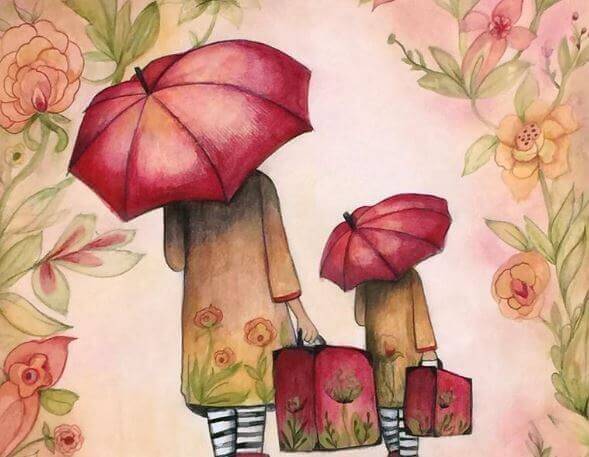We should only value the people who value us and not treat those who treat us as a priority option. It is difficult to get to this point, in large part because we generally expect the selfishness of the person to become at some point a thank you and mutual benefit.
In fact, what we do when we value the wrong people is condition our well-being to the wishes of others, blind our eyes to the evidence, and ignore our emotional needs. We are plagued with selfishness of others.
- With these ideas.
- We ruin the present.
- Fueling the hope that something will change.
- Often due to memories of a past that has no future.
- Because change never happens.
However, although quickly and inconsistently, we are able to realize that there is something that does not work properly in a given relationship, that a certain person has changed over time, or that one day, even if disguised, someone has shown us a less kind or interested part of you.
There is a text attributed to several different authors on the Internet (sometimes Borges for example, or sometimes Shakespeare) that perfectly expresses what we have learned throughout life, it is a good exercise to review phrase by sentence and think about what it means and what it means. we can change or understand to improve our relationships.
Over time, I learned the subtle difference between taking hands and intertwining the soul.
Over time, I learned that loving doesn’t mean leaning on someone and this business doesn’t mean security.
In time? I began to understand that kissing is not contracts and that gifts are not promises.
Over time, I’ve learned that being with someone because that person offers you a bright future means that sooner or later, you’ll want to go back in time.
Over time, you realize that getting married because you’re older is a clear indication that your marriage will fail.
Over time I have realized that only those who are able to love you with all your faults, without wanting to change you, can give you all the happiness you desire.
Eventually, he realizes that if he’s with someone just to alleviate his loneliness, he’ll end up wanting to see him again.
Over time, he realizes that true friends are worth much more than any amount of money.
Over time, I realized that true friends had their fingers, and that if they weren’t pursued sooner or later, they would only be surrounded by false friendships.
Over time, I have learned that words bliss in a moment of anger can hurt someone for life.
Over time, I have learned that anyone can excuse others, but is forgiveness something for high souls?
Over time, I realized that a friend had been seriously injured, the friendship will probably never be the same again.
Over time, you realize that even if you’re happy with your friends, one day you’ll cry for those who are gone.
Over time, you realize that every experience with each person is irreplaceable.
Over time, you realize that anyone who humiliates or despises others, sooner or later, will suffer the same humiliations and contempt multiplied by two.
Over time, I have learned to build all the paths of the present, because tomorrow’s terrain is too uncertain for a plan.
Over time, I realized that rushing things or forcing them to happen means that, in the end, nothing is as expected.
Over time, you realize that the best was not really the future, but the moment when you lived the present.
Over time, you’ll see that even if you’re satisfied with everyone who’s with you, those who were with you yesterday but are now gone will miss you.
Over time, I’ve learned that trying to forgive or apologize, say you love, say you miss yourself, say you have to, say you want a friend, doesn’t it make sense?in front of a coffin?
But, unfortunately, we only understand these things over time
It is true that for some things time is our great teacher, because through him we create perspectives and value the mistakes of the past, our expectations and our demands towards others and ourselves.
Now, this does not mean that time teaches or cures everything; we are the ones who must face feelings in an internal dialogue, alluding here to our personal conflicts that arise from the selfishness of others or even our own.
This means that we must take positions and reaffirm them, without letting others take advantage of us for fear of being annoying or confronted, this is called self-affirmation and is one of the pillars on which our self-esteem and personal identity are built.
We are probably aware of that, but when it comes to truth we are unable to cope with social pressure, in fact, it is normal that in a situation of exploitation our autonomy and our will deviate.
Since it is impossible to pass life without such risks, ideally we imagine these situations that would be potentially dangerous to us and how we could cope with them without being aggressive or passive in our behaviors (i. e. , we train in our imagination). .
In this way, when in reality there is a situation of inequality and we notice that someone is trying to take advantage of us or nullify our will out of pure selfishness, we will be blocked and we will be able to do in practice what we imagine.
In this way, we anticipate problems and become more aware that relationships should always be based on reciprocity and not undermine our identity and self-esteem by favoring others.
It is important to learn to say no, to affirm their presence and to seek in us an ally to face relationships based on the inequality and selfishness of people who think only of themselves.

